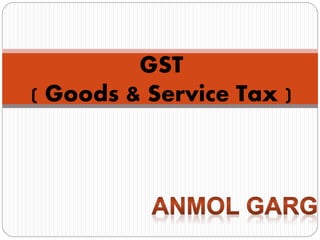Goods & Service Tax (GST)
- 1. GST ( Goods & Service Tax )
- 2. ŌĆó Indirect Taxes- A Journey of reforms ŌĆóExisting Tax & Proposed ŌĆóGST ŌĆóBenefits ŌĆóMain Issues in GST implementation ŌĆóOpportunity for Professional ŌĆóSubsumation of Taxes ŌĆóGST The biggest Tax Reform
- 3. Indirect Taxes- A Journey of Reforms Sales Tax & CST Central Excise Service tax VAT
- 5. Tax Structure Direct Income Tax Wealth Tax Indirect Central Tax Excise Service tax Custom Sales Tax VAT Entertainm ent Tax, Luxury Tax etc.
- 8. 1)GST is the next Generation of reforms in the area of Indian Indirect Tax Reform. 2)It is a comprehensive Tax which would eliminate most of the other indirect tax prevailing in India, like Service Tax , VAT, CST, Excise. 3)Most probably would be effective by 1 April 2016 4)First was introduced in France in 1954 & now prevalent iun 150 other countries world wide.
- 9. GST can be divided into these to parts to explain it better. Charging Tax Getting Credit The dealers registered under GST are required to charge GST at the specified rate of tax on goods & services that supply to customers If the recipient of goods & services is a registered dealer, he will normally be able to claim a credit of the amount of GST he paid, provided he holds a proper tax invoice.
- 10. The net effect is that dealers charge GST but do not keep it, and pay GST but get a credit for it. This means they act essentially as collecting agents for Government. The ultimate burden of tax falls on last and final consumer of goods & services, as this person does not get any credit for the GST paid by him to sellers and service
- 12. Benefits of GST Simpler Tax Structur e Boosts to Exports Competiti ve Pricing Increas ed Tax Revenu es
- 14. Matter Compensation Entry Tax Petrol Tax Proposed 3 years compensation Not to be subsumed Not to be subsumed States Rejects Rejects Rejects Remedy 3 full years & 2 part years compensation To be Subsumed Not to be subsumed
- 16. GST (Goods & service Tax) CGST (Central) Central Excise Duty Additional Excise Duty Service tax Special Additional Duty Surcharge CESS SGST (State) Value Added Tax Sales Tax Entertainm ent Tax Tax on lottery State cess & Surcharges
- 17. ’ü▒ India is all set to roll out the largest indirect tax reform since Independence 1947. Finance minister Arun Jaitley is expected to table the Constitution Amendment Bill in the current session of Parliament to meet the deadline of April 1, 2016, for its introduction. ’ü▒ For the tax to be implemented, the constitution has to be amended & consensus must be reached within states.


















